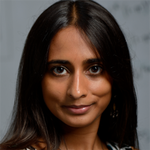By Mike Seele
If you want to harness the power of having faculty from multiple disciplines address a societal challenge, you have to make it easy for them to do so. Cross-disciplinary collaboration has long been part of the college’s DNA, and that culture is now being formalized in way that is unlike any other engineering school.
For the last two years, the college has recruited roughly half of its new faculty according to their alignment with an identified research theme, rather than to individual academic departments. These faculty expect, and are expected to, collaborate meaningfully with research colleagues in multiple disciplines.
Having all faculty recruited to individual departments—the traditional model at virtually every engineering school—often results in a siloed culture, where inter-departmental research is not the norm, and can be difficult. Historically, BU has avoided that by keeping administrative barriers to collaboration low and encouraging such research, and it is now making that approach integral to its faculty hiring.
“We’re hiring early career faculty differently from what we’ve done before and from what anyone else has done,” says Elise Morgan (ME, MSE, BME), associate dean for Research and Faculty Development and the Maysarah K. Sukkar Professor of Engineering Design and Innovation.
“We’re not funneling our thinking or faculty candidates through any particular department. We’re leveraging our strengths by looking for the most outstanding post-graduate and senior graduate students whose research aligns with the themes we’ve identified and relates to multiple departments.”
The approach has wide support from existing faculty and has been eye-opening for faculty candidates, many of whom have been proactively identified and invited to interview. Typically, they have self-selected to apply for positions in traditional departments and are surprised during the interview.
“They are intrigued by this approach and excited by it,” Morgan says. “The top candidates hadn’t known about these kinds of searches.”
The advantage to young faculty members is the opportunity to make a mark on their field years earlier than the traditional system typically allows. “It enables people to do the scholarship they want to do and amplify the impact their scholarship can have,” Morgan noted.
The approach has transformative potential for the college’s long-term future, as well. “It cultivates a sense of excitement around growth in that research area,” Morgan said. “And, it creates the conditions that allow the next set of convergent research areas to bubble up, by building connections among diverse faculty and encouraging them to pursue new ideas.”
“Pulling this off is a testament to the college’s culture,” Morgan added. “Naming that collaborative spirit and developing it further is very powerful.”
Recent Convergent Faculty Hires
 |
Kayhan Batmanghelich
Assistant Professor of ECE |
 |
James Chapman
Assistant Professor of ME |
 |
Brian Depasquale
Assistant Professor of BME & ECE |
 |
Sean Lubner
Assistant Professor of ME & MSE |
 |
Archana Venkataraman
Associate Professor of ECE & BME |
